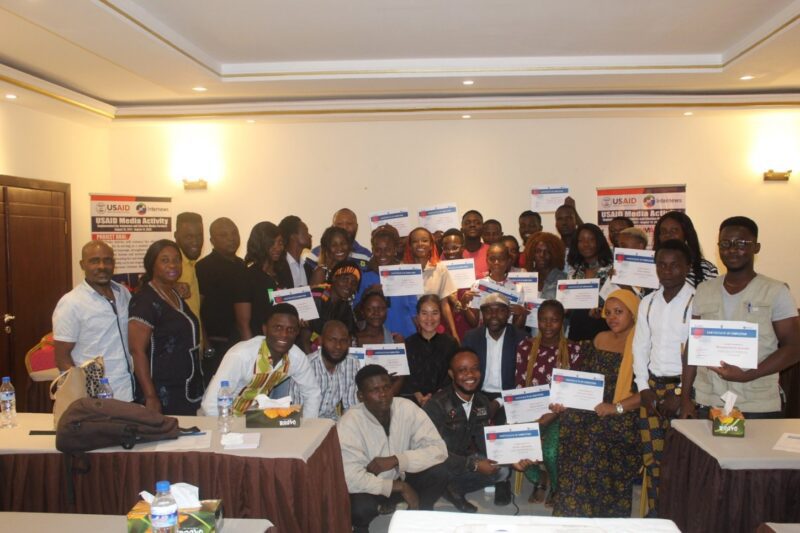Written by Torwon Sulunteh Brown, Internews Senior Journalism Trainer
Over the last five years, the Liberian media sector has experienced an unprecedented increase in the number of practitioners venturing into mainstream journalism, with dozens of new media outlets being established across the country.
However, this upsurge of young and relatively inexperienced media practitioners across the various media platforms has drawn new concerns regarding journalism quality and ethics.
USAID Media Activity, implemented by Internews, is taking strides to hone the skills of young media practitioners through a special fellowship program designed to empower a new cadre of journalists guided by ethics and professionalism. This is done by attracting journalism students from various universities into newsrooms of select media outlets in Monrovia. The program is also intended to address the issues of attrition and increase the income at media institutions affected by the COVID-19 pandemic in Liberia.
The fellowship is not only providing the right skill set to media practitioners to improve journalism quality in Liberia, but it also empowers journalists with the right tools to enhance their work. To facilitate their journey in the field, the fellows have been provided digital recorders and laptops for interviews, script writing, and production.
“This fellowship has built my writing and speaking skills; it has taught me how to gather news stories, especially stories that are of human interest and that can make significant impact in our society.”
Stephen Jatoh Konton, a senior student at the University of Liberia reading Mass communication assigned with the New Public Trust Media Group
The Liberian media has been struggling to maintain good standards of ethical journalism, which has been negatively impacted by the upspring of over 163 radio stations run by people with little or no experience. The Press Union of Liberia, working with the USAID Media Activity, hopes that the fellowship program will help to address these gaps.
“This is intended to bring up new breed of journalists who will be ethical. As it is right now, we have serious problem in the media. People who are not trained to be journalists are masquerading with no training, with no understanding. Because of that, we have this huge polarization in the media. We believe that, with training, this team will bring change to the media landscape.”
PUL Secretary-General, Musa Kanneh

The program, launched in Monrovia on May 5, 2022, is intended to develop a new breed of journalists that are ethical and marketable for job employment. The fellows (F-17; M-13) have been seconded at ten Media outlets (both print and radio) in Monrovia, where they are being mentored professionally by a core group of trained editors to translate their classroom skills to practical experience in the field.
Internews Chief of Party in Liberia, Lien Bach, said that the USAID Media Activity was delighted to partner with the PUL in addressing the gaps through the fellowship, “As you know, you come from universities with a lot of theories, this is an opportunity for you to use the knowledge that you learn from the schools in the real world.”
For Georgia H. Doe, one of the woman fellows assigned at the News Newspaper who has consistently produced interesting stories, there is a great difference between what is taught in the classroom and what happens in the actual newsroom. “Being in the field is quite different and interesting in the sense that you learn faster and become independent, it pushes you to do more research and improve your reading and writing ability. Before then, writing a story was easy, but the real part is to know how to compose and structure the story, and Internews has given me that opportunity.”
To enrich their news coverage and reporting skills, the fellowship is blended with seminars on thematic issues like investigative, data, and health reporting.
Thirteen members of the first batch of fellows enrolled in the program were retained by their host media institutions for their commitment and active contributions to the daily news coverage at those media institutions, some of which are making headlines in the local dailies and broadcast institutions.
One of the institutions, The Heritage Newspaper, confirmed that their weekly publications and incomes were increasing due to the contributions of the new staff scouted from the fellowship. During the initial COVID-19 outbreak, the paper suffered a cut in staff because of a sharp decline in revenue.
